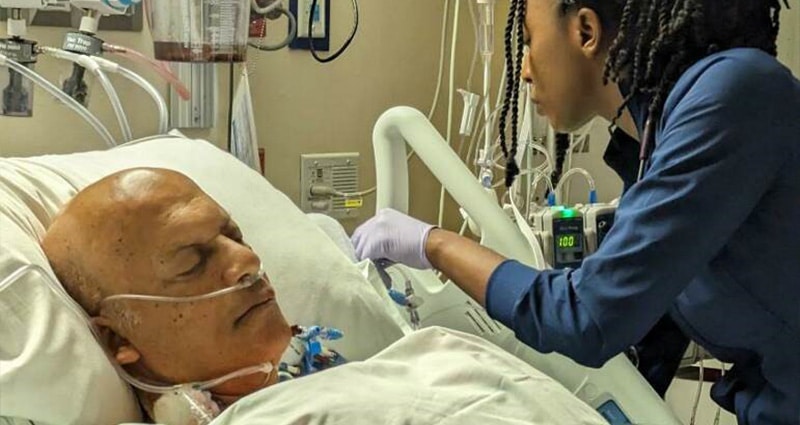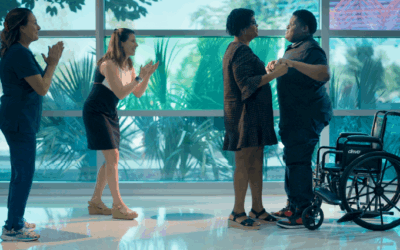When most people think about the symptoms of a heart attack, they often picture sudden problems like chest pain and trouble breathing. However, in many cases, a gradual progression of symptoms like fatigue and a feeling of indigestion are signs that there may be a serious cardiac problem.
“It’s actually quite unusual that you hear of patients who have a sudden pressure in the chest that radiates up into the jaw without anything happening before that point,” said Chance DeWitt, MD, a cardiothoracic surgeon at Our Lady of Lourdes Heart Hospital. “In most cases, things are happening slowly and it’s often the patient’s family that notices. They see that the patient is not nearly as active as they were before or that they are incredibly tired all the time.”
That was the situation for Gregory LaDay, pastor of the Opelousas branch of the Lafayette Greater Apostolic Church. As the leader of a 350-person congregation and an associated private school, a father of 11 and a grandfather of 47, LaDay’s daily calendar is full. So, when he started feeling fatigued and having uncomfortable sensations in his chest at night, he thought it was aging and his busy lifestyle catching up with him. But, one of his daughters, a registered nurse, was concerned about his frequent naps and prompted him to see doctors at Our Lady of Lourdes.
The diagnosis was alarming. LaDay’s heart was functioning at only 30% capacity. He had major blockages in multiple arteries. In fact, doctors felt sure that LaDay was in the midst of a heart attack when he arrived in the hospital’s Emergency Room. He immediately was placed on medications and urged to have surgery. Stunned by the severity of the problems, LaDay opted instead to go home, consider the situation and pray about his options.
“It was too much to process at one time. Everything was happening really fast. I was definitely on the fence about having surgery,” LaDay said. “I was wrestling with my decision because I knew it was a major procedure. I didn’t take that lightly and I didn’t want to rush into that. At the same time, I was concerned about something really bad happening. Ultimately, my family and friends encouraged me to go through with it because the technology is advanced now and most people who have these surgeries come out of them doing well.”
LaDay underwent a triple bypass in early December and is continuing his recovery. He slowly is easing back into his pastoral duties while undergoing cardiac rehabilitation at Our Lady of Lourdes Heart Hospital to strengthen his heart and dialysis to improve his kidneys, which sustained some damage as a result of his cardiac issues. Overall, Dr. DeWitt said LaDay’s recovery has been “remarkable” and something that doctors couldn’t have envisioned a few decades ago.
“If he had the same diagnosis 20 or 30 years ago, we would have sent him home with medication,” Dr. DeWitt said. “But, with the technology today, we were quite confident that we could perform a successful surgery. After the operation, we placed a pump in his heart to improve blood flow and let his heart rest so he could recover. That’s an option that wasn’t always available to us. It makes a big difference in the patient’s overall outcome.”
Dr. DeWitt said other advances in the treatment of heart problems include the increased use of minimally invasive procedures, new medications such as beta blockers and blood thinners, and valve replacements.
“Over time, people are living longer, and there can be more blockages in the arteries as people age,” he pointed out. “The good news is that the treatment of coronary disease is much better now and when a person needs open heart surgery, there are refinements that make it safer and still effective.”
With his surgery behind him and his recovery well underway, LaDay is ready for a healthier future. He’s paying more attention to his diet and is committed to choosing better food options. He’s also making sure to listen to his body and alerting his doctors if anything feels amiss. At age 67, LaDay is hopeful that he has many more years of leading his church and being with his family.
“My advice to people is to stay on top of your health and don’t take anything for granted,” he said. “Watch what you put in your body and what your body is telling you. If you start to feel like something is off, get it checked out immediately. Don’t wait until the last minute.”
Our Lady of Lourdes Health is committed to bringing the most advanced and comprehensive cardiovascular care to the Acadiana region. The Our Lady of Lourdes Heart Hospital is the only hospital in Louisiana with an accredited program by The Joint Commission to treat congestive heart failure. Other offerings include a chest pain network to share best practices, increased access to care and minimally invasive procedures for stroke prevention and improved heart function.




